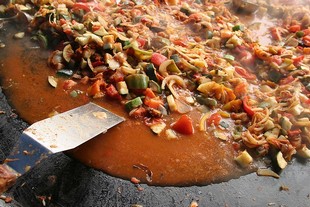The Cuisine of Madrid
by Mike McDougall
Madrid
Hotels - Self-Catering
Accommodation in Madrid - Madrid Travel
Guide
The nations capital is known
for having a broad variety of food and is the place to go if you want to
sample something from all over Spain. Boasting the second largest fish
market in the world, it's often called "Spain's best port" despite being
250 miles from the sea.
The Cuisine of Madrid
The Madrid region (one of
Spainís smallest), as one would expect, is largely dominated by the capital
city itself. It has been said, by gourmands and food critics alike, that
Madrid does not really have an individual cuisine all of its own, rather
it draws on influence from the whole of Spain, absorbing a rich tapestry
of flavors and ingredients and throwing them into itís own gastronomic
melting pot. This is certainly true to some extent; in no other city in
Spain are visitors likely to be presented with such a wide cross section
of the nations flavors. Despite this fact Madrid does still boast a few
dishes that are synonymous with the capital and by absorbing so many influences;
Madrid has become one of Spainís richest gastronomic regions.
 Famed
for its stews and hotpots, Madridís most famous dish is probably "Cocido
Madrileño". Made with chick peas and vegetables it is a staunch
favorite of locals and tourists. "Callos" (tripe) is also typical of the
region and can be served in many ways and visitors should not leave without
having sampled the simple, yet delicious, "Sopa de Ajo" (garlic soup).
The region is also heavily influenced by nearby Castile an area famous
for its roasted meats and these traditions have been readily absorbed by
Madrilenos. Meats are often slow cooked in a wood oven, giving exquisite
flavor and tenderness. Veal, suckling pig and even goat, are often prepared
in this way. Food in the region is often more warm and hearty than in the
South and is much better suited to the cooler winters of the central and
northern regions of Spain. Famed
for its stews and hotpots, Madridís most famous dish is probably "Cocido
Madrileño". Made with chick peas and vegetables it is a staunch
favorite of locals and tourists. "Callos" (tripe) is also typical of the
region and can be served in many ways and visitors should not leave without
having sampled the simple, yet delicious, "Sopa de Ajo" (garlic soup).
The region is also heavily influenced by nearby Castile an area famous
for its roasted meats and these traditions have been readily absorbed by
Madrilenos. Meats are often slow cooked in a wood oven, giving exquisite
flavor and tenderness. Veal, suckling pig and even goat, are often prepared
in this way. Food in the region is often more warm and hearty than in the
South and is much better suited to the cooler winters of the central and
northern regions of Spain.
Desserts and sweets are also
a big thing in Madrid and are often seasonally produced. The superb "torrijas"
is very similar to bread and butter pudding and a favorite in spring time
and especially around the time of holy Week.
Rather surprisingly for an
area that is 250 miles from the nearest ocean, Mardileños are great
lovers of fish and the city boasts the second largest fish market in the
world, only the one in Tokyo is larger. Every morning fresh fish arrives
by the truck-load from Spainís coastal regions filling the cities restaurants
and bars with a massive variety of seafood, so much so that Madrid has
received the paradoxical nickname of "the best port in Spain".
As you would expect, Madrid
is home to some excellent restaurants with no shortage of fine dining options
as well as a massive variety of tapas bars. Some criticism has been leveled
at Madrid in recent times about the lack of high quality international
cuisine on offer and vegetarians (not exactly two-a-penny in Spain) may
also find it hard to find a decent meal. Spaniards are very much a meat
eating race so vegetarian dishes in restaurants may not be of the highest
quality (although standards have improved within recent years). The ever
growing city break market means that cityís such as Madrid have to provide
good quality food for all of their tourist visitors if it wants to keep
them coming back. This can only be a good thing for the city thatís ability
to adapt and adopt food from around Spain has clearly given Madrid its
own unique cuisine.
Top
Madrid
Hotels - Holiday Rental
Accommodation in Madrid - Madrid Travel
Guide
|

